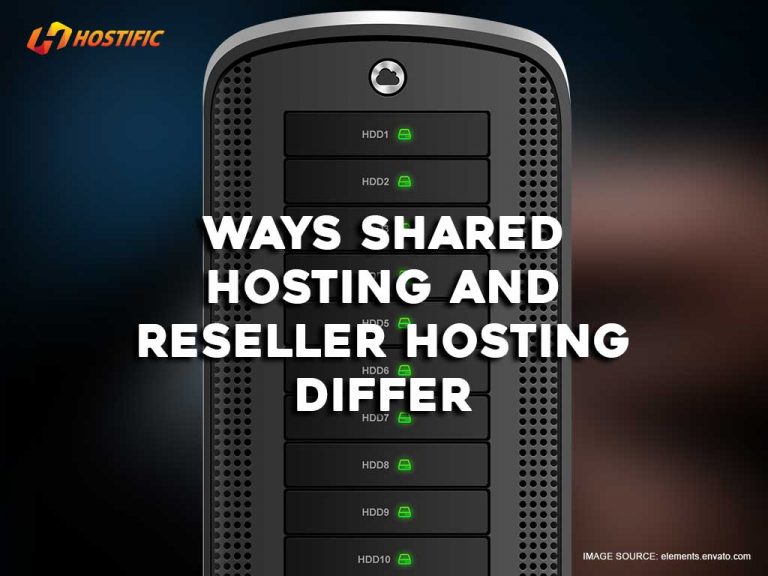Persons create websites for various reasons. Whether it’s to provide information, extend their company’s brand, sell products and/or services, blog or even become a web host. There are many web hosting options and today, we’ll zoom in on two- shared hosting and reseller hosting. We’ll explore what makes them different and highlight which works best for whom.
Table of Contents
What exactly is Shared Hosting?
With shared hosting the service provider hosts multiple websites on a single web server, while providing each with its own internet domain name. Most web hosting service providers offer shared hosting plans. It is the easiest and most affordable way for a business to create a website.
Advantages of Shared Hosting
- It’s the most inexpensive web hosting solution.
- It’s very user-friendly and ideal for beginners.
- You are responsible for your own security, upgrades, and maintenance.
Downsides of Shared Hosting
- It can be very slow.
- It’s not the most secure hosting option.
- Isn’t very scalable since it already has limited bandwidth and storage
Who uses Shared Hosting?
Shared hosting works best for individuals and businesses who simply want a means of getting their website online. With this hosting option, your web host is in control of the resources that are allocated to you. You can then work on your design, email setup, and domain management.
What is Reseller Hosting and who is it for?
Reseller hosting also known as white label hosting is a form of web hosting that allows the account owner to use his or her allotted hard drive space and bandwidth to host third party websites. You can purchase white label hosting services in bulk, rebrand and resell them to customers, for a profit. With a little effort, you’ll be able to gain an additional revenue from your reseller web hosting business.
Advantages of a Reseller Hosting
- Facilitates the flexibility to monitor your hosting accounts.
- You can create an additional income at little cost to yourself.
- While your web host provider takes care of technical support, you can focus on supporting your customers and growing your business.
- No maintenance costs as your web host provider covers them.
Downsides of Reseller Hosting
- Ensure you use a top-tier web hosting service provider, as the quality of service you offer is dependent on your hosting platform’s performance. Whenever their website goes down, so will yours.
- It can be a difficult task and great inconvenience to your clients if you need to migrate to another hosting platform.
Who uses Reseller Hosting?
Reseller hosting creates a great business opportunity for freelance developers who want to host multiple client sites. It’s also ideal for technologically savvy entrepreneurs and individuals who want to create a start-up. The process is simple and once you buy a select amount of bandwidth and server resources from a host, you can then reallocate these resources to your own clients. With reseller hosting you have more control over your server settings and domains. This hosting solution also comes with billing tools, as you are in fact running your own hosting business.
Similarities between Shared Hosting and Reseller Hosting
Both shared hosting and reseller hosting, for the most part, use a singular server that’s shared by multiple customers. Reseller hosting/ white label hosting simply adds an additional layer of ownership in between the website owner and the original server host.
4 Differences between Shared Hosting and Reseller Hosting
Shared hosting is ideal for single websites, small companies and websites with low-traffic. On the other hand, reseller web hosting is designed for persons who are interested in hosting multiple websites or selling hosting services.
You are not allowed to do reselling on shared hosting plans. Here are some other ways in which shared hosting and reseller hosting differ.
1. Overall Security and Performance
There’s a central risk and reward associated with Shared hosting. Since you share server resources, such as bandwidth, storage, and RAM you don’t have to pay a great deal for website monitoring and upkeep. However, sharing the same server with other website leaves your site susceptible to anything that compromises your neighbours’ sites. It is, however, a reasonably safe web hosting option.
In terms of performance, shared hosting offers a limited amount of resources that are dispersed among customers. As a result, once your site starts attracting a large number of visitors you may start experiencing reduced speed and even downtime in a worst-case scenario. Outgrowing your shared hosting environment usually leads you to a hosting upgrade to VPS or dedicated server hosting.
However, if you are looking towards having multiple high performing websites reseller hosting is the better option for you. You can also purchase a premium web hosting plan to enhance your website’s security regardless of the type.
2. The Difference in Control Panel – cPanel / WHM Control
Though both shared and reseller hosting users receive a management panel, they are not the same. Shared hosting normally has web hosting with cPanel while reseller hosting uses Web Host Manager (WHM).
A web hosting control panel, such as cPanel, allows users to access management options for domains, email, FTP, databases, and backups. You are also allowed to download and install other software such as WordPress, Joomla or Drupal. Most web hosting companies offer a free web hosting with cPanel license as part of their shared hosting accounts.
Reseller hosting users simply receive an upgraded version of cPanel. They get cPanel & WHM. Web Host Manager (WHM) carries out the task of facilitating billing and hosting account management portal for your web hosting business. With it, you can create, change, set up server alerts and manage reseller accounts and admin permissions. You can also install SSL certificates, assign custom features, upgrade or downgrade specific hosting accounts, and limit client bandwidth usage among other things.
3. The Number of Websites You Are Able To Host
On a basic plan, most shared hosting users can host one website. However, some web hosts, allow you to host unlimited websites using a single account. Some will provide these services with a premium web hosting plan.
With a reseller hosting plan, you can host several other sites. You can also reallocate resources in the way you see fit. Resellers also have the ability to create personal nameservers, which help to streamline the management complexities of hosting multiple websites. A nameserver translates domain names into IP addresses and vice versa. Life would be tedious without nameservers. If there were no nameserver, we’d all have to memorise the 10-digit code IP address for all the websites we visit daily.
Luckily, domain names are easier to memorise, and nameservers make it possible for us to use them to navigate the web. With personal nameservers you get even greater control over your domain and your clients’ domain names that you can associate with your main domain. This further simplifies the management of your clients’ websites.
4. Web Hosting Cost
When it comes on to web hosting costs, shared hosting is the most inexpensive. Since, Reseller Hosting is more than just hosting your website, it is a business venture, it costs a little extra. As a result, it will require a bit more monetary investment. The added server resources you may require for your reseller hosting will bump the price up a bit especially when compared to shared hosting.
Summary
Shared hosting plans are for individual websites, and it doesn’t facilitate reseller hosting/ white label hosting as it would affect other server users. Also, with shared hosting, only one control panel is provided for all the domains. If a single website that doesn’t require a lot of resources is your goal, then shared hosting will work for you.
On the other hand, a reseller hosting plan allows individuals to resell web hosting services and comes equipped with unlimited control panels. You are basically the owner of a web hosting business. If you need several IP addresses or SSL certificates, and wish to host multiple websites, then go with a reseller hosting plan.
Searching For A Webhosting Plan?
Whether you are looking for a shared hosting plan, wanting to upgrade to VPS or Dedicated server, or want to resell hosting packages, Hostific has a plan that’s ideal for you. We also offer website building and SEO tools to help you create your dream website and watch it successfully grow.






